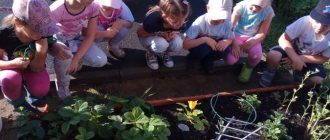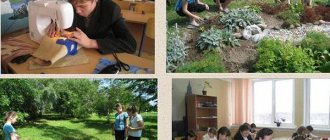The process of formation of economic thinking
An analysis of psychological and pedagogical literature shows that the problem of the content of economic education for preschool children is complex and ambiguous. In fact, economic education as a process of forming economic thinking, developing business qualities, social activity and entrepreneurship is only partially applicable to preschoolers, due to the age-related characteristics of their mental development.
HELL. Shatova believes that “the purpose of labor in economic education is to instill in children the correct attitude towards what adults have done and are doing for them, respect for human labor, thanks to which an “objective world that ennobles life” has been created.”
Economic education of preschool children should emphasize its relationship with moral education. In conditions of capitalization of the economy, the younger generation’s ideas about justice and honesty often shift towards permissiveness, materialism, selfishness and the desire to get rich at any cost.
The period of senior preschool age is the most favorable for the formation of the first ideas about the moral and legal foundations of the market, which, according to B.T. Likhachev, “are the simple rules of human morality”: Honesty, strength and reliability of a given word; politeness, respect for employees, partners, and consumers.”
For the effectiveness of the process of economic education of children of senior preschool age, researchers have determined optimal pedagogical conditions. Let us dwell on the first condition - the creation of an economically educational environment aimed at the formation of such moral and economic qualities of the individual as thrift, responsibility, business sense, entrepreneurship, ensuring life in society.
Based on the research of I.I. Pidkasisty, the environment of economic support is understood as a set of phenomena and events that surround the child, influence his personal development and contribute to his entry into the world of socio-economic relations.
The contents of an economically supported environment include:
- object-spatial environment (creation of a gaming economic zone);
- socio-behavioral environment (parents, teaching staff of a preschool educational institution);
- event-cognitive environment (excursions, meetings with interesting people);
- Information environment (crosswords, illustrations, layouts of stores, banks, service centers, coin samples, map of industrial enterprises of the city).
A teacher who professionally uses the influence of these social agents gives this influence a target orientation, transforming the social situation of development into a pedagogical one - creating an educational environment aimed at the formation of leading moral and ethical qualities.
In preschool age, moral feelings begin to form, which are important for the development of decent relationships. The sincere attitude of adults towards someone or something soon turns into the attitude of children towards the same persons and phenomena, expressed in corresponding morally oriented feelings. There is an active desire to help and support each other. The emergence of friendship between children and a caring attitude towards each other occurs on the basis of the first forms of a sense of duty and responsibility.
Game as a means of economic education of children of senior preschool age
This article highlights theoretical and practical issues of using games as a means of economic education in a modern preschool educational organization.
In modern conditions, there has been a significant increase in public interest in the process of economic education of the younger generation. New economic conditions contribute to the formation of modern children as full participants in socio-economic processes, which leads to the need to organize the economic education of children already in preschool age. In the process of economic education of preschool children in preschool educational organizations, the economic literacy of children is increased, a modern style of thinking is developed, which meets the requirements of the time, and represents the basis for further educational work.
In the studies of A.D. Shatova, an accelerated pace of socialization of children is noted; the author, as a result of empirical research, confirmed the possibility of mastering certain economic concepts in senior preschool age and correlating them with a number of relevant life situations [6].
Economic education is the most important component of the modern pedagogical system of a preschool educational organization. In the literature, economic education is defined as a pedagogical process, which is aimed at the formation of a complex of moral and economic qualities of an individual, the assimilation of ideas about the peculiarities of the economic life of people, focused on value attitudes [4].
Preschool age is favorable for developing children's economic literacy. To ensure the success of preschoolers’ knowledge of socio-economic categories, it is important to use a game that is an accessible and interesting activity for the child.
Role-playing game is the most typical type of play activity of children in preschool age; in the process of play activity, children model the activities of adults, the relationships between them, based on the play plot, and therefore the role-playing game provides an opportunity to ensure the comprehensive development of preschool children, and is also an effective means of economic education for older preschoolers.
The success of using role-playing games as a means of economic education for children of senior preschool age significantly depends on its management. Pedagogical guidance of the play activities of preschoolers is understood as the use of a set of various methods and techniques that expand the themes of role-playing games, enriching its content, and facilitating children’s mastery of role-playing behavior [4]. The system for guiding role-playing games for preschoolers includes: introducing children to the world around them using active activities, enriching children’s gaming experience, and organizing a developing subject-spatial environment.
The main pedagogical conditions that influence the success of using role-playing games as a means of economic education for preschool children are:
– implementation of an integrated approach to enriching the play practice of preschool children with economically feasible content together with the organization of moral and labor education;
– organization of a developing subject-spatial environment;
– purposeful interaction of a preschool educational organization with the families of preschool children.
In the process of economic education of children of senior preschool age, it is necessary to implement a complex of role-playing games, which together will contribute to solving the problems of economic, moral and labor education of children of senior preschool age
A role-playing game allows you to simulate a number of life situations: a purchase or sale operation, production and marketing of finished products, etc.
The implementation of role-playing games with economic content in practical activities helps to solve the following problems:
– consolidation in a playful form of preschoolers’ ideas about such accessible concepts as money, goods, labor;
– application of economic knowledge in a specific situation;
– developing the skills of caring for different types of property, instilling respect for work and working people.
Practical studies by such authors as L.N. Galkina, L.S. Gumerova, L.G. Kireeva, V.P. Makeenok will help in developing the content aspect [1; 2; 3; 5].
To use role-playing games as a means of economic education for children of senior preschool age, we consider it necessary:
– determine the appropriate content of economic education for children of senior preschool age;
– ensure the interrelation of economic, labor, moral education;
– create a zone of economic play space, which includes activating game material that allows you to organize an independent role-playing game with economic content;
– to ensure the relationship between the family and the preschool educational organization on the problems of economic education of older preschoolers.
Role-playing games that can be used for the economic education of children of senior preschool age can be grouped according to the following topics:
– labor;
– the world of money;
- goods;
- thrifty owner.
Examples of role-playing games on the topic “Labor” are: “Construction site”, “Pharmacy”, “Hairdressing salon”, “Polyclinic”, “Confectionery factory”, etc. As part of the organization of these games, preschool children are reinforced with ideas about tools of labor, about labor as an economic category, about the role of labor in human life, familiarization with the production cycle of producing a product or receiving a service is carried out, the relationships between the concepts of “labor”, “product”, “money” are established.
On the topic “World of Money” the following role-playing games can be played: “Bank”, “Fair”, “Currency exchange office”. The implementation of these games will allow children to be introduced to banknotes and simple financial transactions; in addition, they will develop the ability to independently determine the profitability of a purchase, and will be given the concept of the quality of a product and the concept of profit when selling it. These games also allow you to form the right attitude towards money, which is a vital necessity.
As examples of role-playing games on the topic “Products” the following can be presented: “Supermarket”, “Children’s cafe”, Travel agency”, etc. As a result of using these games, children learn that there are different forms of selling products, children establish dependence the cost of a product depends on such important parameters as quality and quantity; games teach the correct perception of advertising; reasonable needs, economy, and prudence are fostered.
The theme “Thrifty Owner” can be implemented in the process of organizing the following role-playing games: “Thrifty Family”, “Travel”, “Useful Shopping”. In the course of these games, reasonable behavior is brought up in various life situations that are directly related to money, preschoolers develop an idea of the budget, the need to correlate income and expenses, learn planning, independently solve problematic economic situations, and are given ideas about a set of qualities (thrift, rationality, economy, hard work).
The implementation of these games occurs in stages:
– during the training stage, the teacher widely uses methods of direct guidance of role-playing games;
– at the consolidating stage, indirect techniques are used, the teacher plays a secondary role;
– the stage of creative development of the game involves the teacher playing the role of an observer; children are characterized by independence and creativity in the game.
As part of the economic education of children of senior preschool age, by means of role-playing games, conversations are held as preliminary work, problem situations are created aimed at solving various economic problems, didactic games with economic content are organized, productive activities are organized, reading fiction that has a moral economic orientation.
An important condition for the implementation of role-playing games with an economic focus is the organization of a developing subject-spatial environment (an activating economic zone." The economic zone can be represented by gaming equipment with an economic theme (toy cash registers, ATMs, money counting machines, office equipment, counters, etc. .), sets of banknotes, coins, dolls in costumes of various professions, dummies of goods, stamps, ready-made forms, magnetic cards, various waste materials for making attributes, uniforms, etc. The developing subject-spatial environment is also replenished by the design of albums , which presents the country's coins, currency, a library of books about money, business, educational games, illustrations, photographs.
It is important to organize the interaction of a preschool educational organization with parents of preschool children. For this purpose, various forms of work are used: information assistance (design of stands and reminders, consultations “Features of economic education of preschoolers”, “Economic games for preschoolers”, etc.), holding parent meetings, organizing individual excursions for parents and children (to the bank, supermarket, to the pharmacy, to the studio, etc.), involving parents in expanding and enriching the developing subject-spatial environment in the group (parents provide assistance in making paraphernalia for the role-playing game).
So, in the course of organizing role-playing games of economic content in senior preschool age, preschoolers acquire the necessary minimum of economic knowledge (about the rational use of time, about work, about money as the equivalent of the result of human labor, etc.), and develop economic skills ( the ability to balance the level of satisfaction of one’s needs with material capabilities; the ability to organize one’s work with the least expenditure of time, effort and money; to show frugality in everyday practical activities; the ability to correctly use economic concepts in speech, etc.), the development of economically significant qualities (frugality, hard work , neatness).
Literature:
- Galkina, L. N. Development of economic abilities in children of senior preschool age / L. N. Galkina // Gifted child. - 2010. - No. 4. - P.42.
- Gumerova, L. S. Subject-spatial environment of preschool educational institutions as a condition for the economic education of preschool children / L. S. Gumerova // In the world of scientific discoveries. - 2012. - No. 2. - P. 12.
- Let's play economics: comprehensive activities, role-playing games and didactic games. / Auto - comp. L. G. Kireeva. - Volgograd: Teacher, 2008.
- Kodzhaspirova, G. M. Pedagogical dictionary / G. M. Kodzhaspirova, A. Yu. Kodzhaspirov. - M.: Academy, 2003.
- Makeenok, V. P. Economic education of preschool children in the educational space of preschool educational institutions / V. P. Makeenok // Pedagogical Sciences. - 2011. - No. 3. - P. 43.
- Shatova, A. D. Economic education of preschool children / A. D. Shatova. - M.: Pedagogical Society of Russia, 2005.
Why does a preschooler need economics?
So, what are the goals of the program, or why does a preschooler need economics:
- The child must understand and appreciate the material world around him (the material world as a result of people’s labor);
- Respect people who know how to work well and earn money honestly;
- Understand at a level accessible to him/her the connection between the concept of “work - product - money” and the fact that the value of a product depends on its quality;
- Seeing the beauty of human creation;
- Recognize the qualities of a master as decisive: Thrift, economy, diligence in work, as well as generosity, magnanimity, honesty, sympathy, charity (examples of patronage, financial support, etc.).
- Behave correctly in real life situations;
- Satisfy your own needs according to your age.
The program consists of four blocks: “Work is a product”, “Advertising”, “Money”, “Useful skills and habits in everyday life”. Despite the internal connection of the blocks, each of them can be implemented independently as a mini-program.
The program is designed to work with children of senior preschool age - from five to six years old. When choosing blocks, it is easy to find the internal connection that establishes a certain system of work. We do not introduce children to the concept of “needs,” but it is embedded in the “work - product” block. Children gain insight into why all adults work. The result of people's labor is a product of labor (various goods, things, toys, food, etc.), which all people need: both children and adults.
A series of varied activities allows children to understand the role of work in life, where all kinds of goods necessary for human life come from. It is recommended to introduce preschoolers to such new professions as businessman, manager, advertiser, advertising agent.
This is how the product is made. And what is his future fate? When it is created, all people should know about it. There is advertising for this (the “Advertising” block), this material is of great interest to children. They get acquainted with the concept of “advertising”, find out what it is, think about advertising on city tours, in special classes with parents, and come up with advertising on their own, starting with the phrase: “If I had my own business.”
But with the help of advertising, people learn where and what goods to buy. But how to do that? The next stage of work is introducing children to the topic of money. There is no need to be afraid that talking about money can cause an unhealthy increased interest in children. We discuss various life situations with children: what happened when there was no money; what is money; what kind of money is used in different countries (near and far); what is the purpose of money, a vital necessity; where do they come from?
Finally, goods are bought with money. The next step is “once you buy something, you know how to use it.” Hence the name of the block “Useful skills and habits in everyday life” - “Economics”. This section is quite understandable to any educator, as it is associated with one of the traditional areas of kindergarten work - developing the skills and habits of a behavioral culture. The author emphasized only its economic aspect (attitude to light, water, food, etc.).
According to N.A. Strunilina, economic education has a clearly applied nature, therefore the techniques and methods for its implementation should be taken from the general arsenal of pedagogical techniques and methods. They should be immersive and active to a greater extent. Firstly, at each stage there is a call for discussion and commentary on each issue raised in the lesson, this is a mandatory summing up by the teacher with an assessment of the correctness and incorrectness of the children’s statements and behavior.


